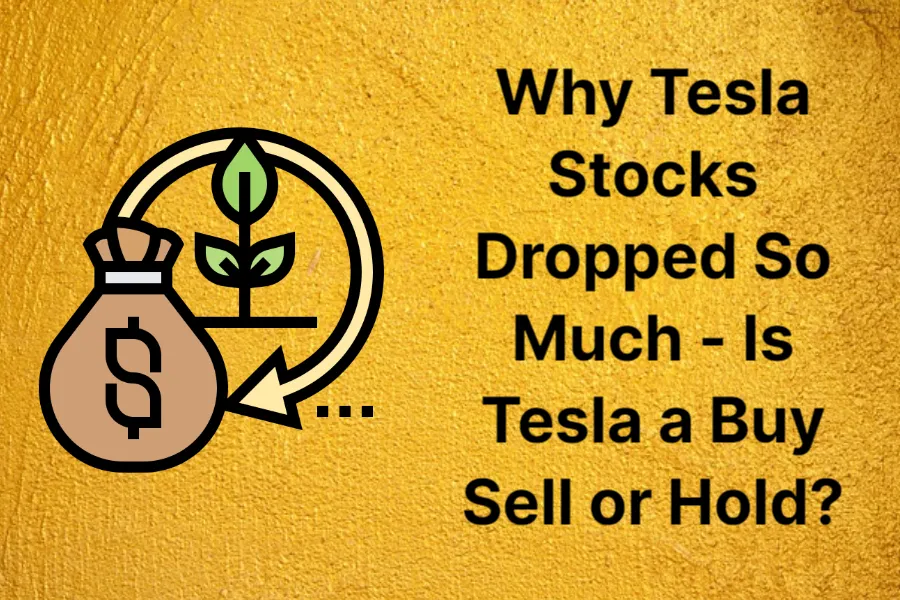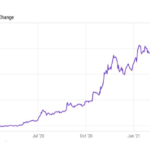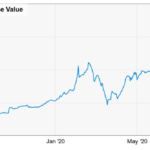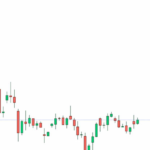Tesla stock’s value declined all through 2022. Elon Musk’s net worth has been severely impacted by the declining prices, and other Tesla investors are also alarmed by the trend.
Let’s examine the reasons behind the sharp decline in the price of Tesla stock in more detail, as well as potential future outcomes.
Is Tesla’s Stock Decline Really That Bad?

Tesla’s stock has been on a rollercoaster ride in recent years, with significant gains followed by sharp declines. In early 2021, Tesla‘s stock price hit an all-time high of around $900 per share, but it has since declined by more than 30% to around $600 per share as of March 2023.
While any decline in stock price can be concerning to investors, it’s important to keep in mind that stock prices can fluctuate for many reasons, including market conditions, company performance, and broader economic factors. Additionally, Tesla is a highly volatile stock, which means that it tends to experience larger swings in price compared to more stable companies.
Read More: How to Buy Tesla Stock on eToro – Step by Step Guide 2023

Furthermore, it’s worth noting that Tesla is still a relatively new company, and as such, it’s not yet clear what the long-term outlook for the company will be. While Tesla has shown impressive growth in recent years, there are also concerns about the company’s ability to maintain that growth over the long term, as well as its ability to turn a profit consistently.
In conclusion, whether or not Tesla’s stock decline is “really that bad” depends on individual investors’ perspectives and investment goals. Some may see the decline as an opportunity to buy shares at a lower price, while others may see it as a reason to sell or avoid the stock altogether.
Read More: Tesla Stock Price Prediction 2022 – 2030
Is Tesla Stock Declining Because Elon Musk is Doing a Bad Job at Running Twitter?
There is no evidence to suggest that Tesla’s stock decline is directly related to Elon Musk’s Twitter activity. While Elon Musk’s tweets have occasionally generated controversy and criticism, it is unlikely that they have had a significant impact on the overall performance of the company.

The price of a company’s stock is influenced by a wide range of factors, including the company’s financial performance, industry trends, and market conditions. In the case of Tesla, factors such as production challenges, competition from other automakers, and regulatory issues are likely to be more significant drivers of the stock’s performance than Elon Musk’s Twitter activity.
Also Read: Is The Stock Market Going to Crash In 2023
It’s also worth noting that while Elon Musk’s tweets have generated attention and headlines, they may not necessarily reflect the views or strategies of the company as a whole. As the CEO of Tesla, Musk has a broad range of responsibilities and decisions to make, and his personal social media activity is just one aspect of his role.
In conclusion, while Elon Musk’s Twitter activity may generate buzz and controversy, it is unlikely to be the primary driver of Tesla’s stock performance.
Is Tesla Just Part of a Larger Tech Decline?
The performance of Tesla’s stock is influenced by a wide range of factors, including the company’s financial performance, industry trends, and market conditions. While there has been some volatility in the technology sector in recent months, it is not accurate to say that Tesla’s decline is solely due to a larger tech decline.
There are several reasons for Tesla’s stock decline, including concerns about the company’s ability to meet production targets, increased competition from other automakers, and regulatory issues. Additionally, the volatility of Tesla’s stock is partly due to the fact that it is a highly valued and innovative company in a fast-changing industry, and as such, it tends to experience larger swings in price compared to more stable companies.

That being said, the technology sector as a whole has experienced some volatility in recent months, with concerns about rising interest rates, inflation, and increased regulation contributing to some declines in tech stocks. However, it’s important to note that different technology companies are affected by these factors to varying degrees, and there is no one-size-fits-all explanation for the performance of the sector as a whole.
In conclusion, while there may be some broader market trends that are affecting Tesla’s stock, it is important to consider the specific factors that are driving the company’s performance. Ultimately, the performance of Tesla’s stock will be influenced by a complex set of factors, including the company’s financial performance, industry trends, and broader market conditions.

Does Tesla’s Stock Decline Have Hidden Causes?
It is difficult to say definitively whether there are hidden causes behind Tesla’s stock decline, as the factors that influence the performance of a company’s stock can be complex and multifaceted. That being said, there are several possible factors that could be contributing to Tesla’s recent decline.
One possible factor is increased competition in the electric vehicle market. While Tesla was one of the first companies to produce mass-market electric vehicles, several other major automakers have since entered the market, including Volkswagen, General Motors, and Ford. This increased competition could be putting pressure on Tesla’s market share and revenue growth.

Another possible factor is concerns about supply chain disruptions and production delays. The COVID-19 pandemic has created significant disruptions in global supply chains, and the automotive industry has been particularly affected by chip shortages and other logistical challenges. These disruptions could be impacting Tesla’s ability to produce vehicles and meet demand.
Regulatory concerns could also be contributing to Tesla’s stock decline. In recent months, there have been increasing calls for greater regulation of the tech industry, particularly in areas such as data privacy and antitrust. While Tesla is primarily an automaker, it is also involved in areas such as renewable energy and autonomous driving, which could be subject to increased regulatory scrutiny.

Finally, broader market trends such as rising interest rates and inflation could be affecting Tesla’s stock performance. When interest rates rise, investors may be more likely to shift their investments from high-growth stocks like Tesla to more stable, income-generating assets. Similarly, inflation can reduce the purchasing power of consumers and make it more difficult for companies like Tesla to maintain revenue growth.
In conclusion, there may be several factors contributing to Tesla’s recent stock decline, some of which may be more hidden or difficult to identify than others. While it is difficult to say with certainty what is driving the decline, investors should consider a range of factors when evaluating the long-term prospects of the company.
How to Invest in Clean Technology?
Investing in clean technology can be a great way to support companies that are working towards a more sustainable future while also potentially earning a return on your investment. Here are some steps to consider when investing in clean technology:

- Research companies and funds: Start by researching companies that are involved in clean technology, such as those that produce electric vehicles, renewable energy systems, or energy-efficient buildings. You can also look into clean technology funds, which invest in a diversified portfolio of companies in the sector.
- Consider your investment strategy: Determine whether you are looking for short-term or long-term investments, and whether you prefer high-risk, high-reward opportunities or more conservative investments. This will help you choose the types of investments that are best suited to your financial goals.
- Evaluate the financial performance of the companies or funds: Look at the financial performance of the companies or funds you are considering, including their revenue growth, profitability, and stock price trends. Consider consulting with a financial advisor or conducting your own research to evaluate the potential risks and returns of each investment.
- Look for socially responsible investment options: Some investment platforms offer socially responsible investment options, which allow you to invest in companies that align with your values and beliefs. These options may include clean technology funds or portfolios that prioritize companies with strong environmental or social practices.
- Be prepared for volatility: Keep in mind that investing in clean technology can be volatile, as the sector is still evolving and may be subject to regulatory changes or other external factors. It’s important to be prepared for potential fluctuations in the market and to maintain a diversified portfolio to manage risk.
In summary, investing in clean technology can be a great way to support companies that are working towards a more sustainable future while also potentially earning a return on your investment. It’s important to research companies and funds, evaluate their financial performance, and be prepared for potential volatility in the market.
Check More Stocks Information in BtcAdv Blog!
The Bottom Line for Tesla Stocks Dropped

The bottom line for Tesla stocks dropped recently due to a number of factors. These include concerns about the company’s ability to meet production targets, increased competition from other automakers, regulatory issues, and supply chain disruptions. Additionally, the technology sector as a whole has experienced some volatility in recent months, with concerns about rising interest rates, inflation, and increased regulation contributing to some declines in tech stocks.
It’s important to note that the performance of Tesla’s stock can be influenced by a range of factors, including both internal and external factors. While there may be some hidden causes or factors that are difficult to identify, investors should carefully evaluate the long-term prospects of the company and consider a range of factors when making investment decisions. Ultimately, the decision to invest in Tesla or any other company should be based on a thorough evaluation of the company’s financial performance, industry trends, and broader market conditions.











